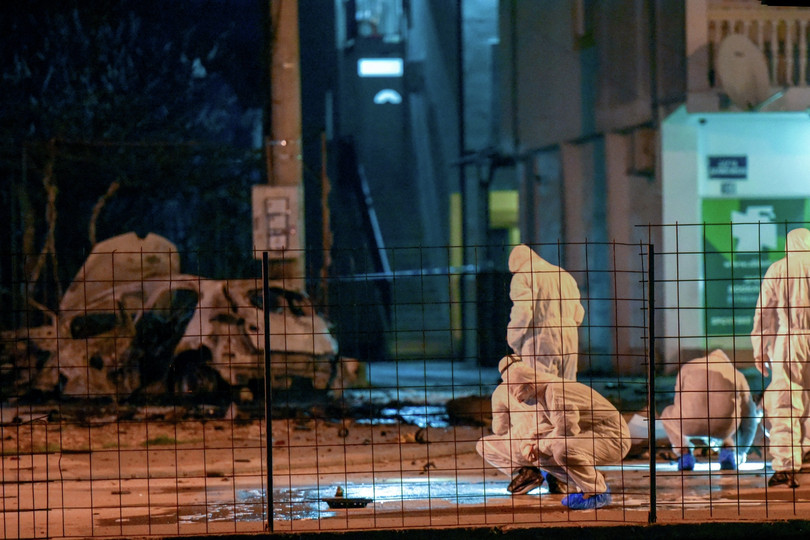No lockdown for the Kotor gangs.
Montenegro was in lockdown for most of the spring. It was the last country in Europe to register a case of COVID-191(on 17 March) and, 68 days later (on 24 May), it was the first European country to declare itself free of the virus.2 But while the government trumpeted its firm handling of the pandemic, it was taking a less tough stance on organized crime. The bosses of the feuding Kavač and Škaljari clans, who were arrested in 2018, are now both out on bail under heavy police protection and, meanwhile, the cycle of retaliatory inter-gang killings continues unabated.
The tit-for-tat killings that have gone on in the Montenegrin underworld since a shipment of cocaine went missing in Spain in 2014 (which triggered a split in the criminal clans based in Kotor) continued during the COVID-19 crisis, regardless of the lockdown measures. One man was killed and another injured on 4 March when the car that they were in was blown up near a supermarket in the capital, Podgorica. A passer-by was also injured. Both men were known to the police; the dead man is alleged to have been a member of the Škaljari clan.3
Later, four men tried to kill the alleged boss of the rival Kavač clan, Radoje Zvicer, in Kyiv on 27 May.4 And two members of the Škaljari clan were brutally murdered in a hail of machine-gun fire in Corfu on 23 July.5 These killings follow a pattern analyzed by the GI-TOC in a report published in July 2020, ‘Making a killing: What assassinations reveal about the Montenegro drug war’.6
Two high-ranking members of the rival clans have recently been let out of jail. At the end of July 2020, the alleged leader of the Škaljari clan, Jovan Vukotić, who had been arrested in Turkey in 2018, was released because the prosecution did not complete indictment within the time limit prescribed by law.7 Vukotić had been charged with attempted murder and illegal possession of weapons and explosives. He had previously served a 15-month sentence for using a false passport. His bail follows the release of Slobodan Kašćelan (also Kascalan), the alleged head of the Kavač clan, who was arrested in Prague in December 2018.8 Kašćelan was released in December 2019 after posting bail of almost half a million euros. The prosecution has claimed that Kašćelan ran a criminal group involved in drug smuggling, money laundering and extortion.9

Forensic experts look for clues after a car bomb explosion in Podgorica, Montenegro, in March 2020 in which a Škaljari clan member is thought to have been killed.
© PetarJovanovic/eStock
Despite the bloody and protracted nature of this gang war, which is tarnishing the reputation of Montenegro, it received almost no attention from politicians during the campaign for the parliamentary elections that took place on 30 August. Would a new government in Montenegro have the appetite to stop the cocaine clan war? There are signs that a potential coalition government might take a harder stance against organized crime – at least on paper. In the cooperation agreement between the three coalition parties signed on 8 September 2020, the three leaders pledged that ‘the new democratic government in Montenegro will completely depoliticise key government institutions with a view to ensuring an uncompromising fight against organized crime and corruption’.10
In reality, it will not be easy for the new government to break the networks created by the Kotor clans that have become entrenched within the country and further afield thanks to revenue they have amassed from cocaine trafficking from Latin America to Western Europe. It should also be kept in mind that although the Democratic Party of Socialists now find themselves voted out of power for the first time in 30 years, the party leader, Milo Djukanovic, remains the country’s president. But dealing with this issue, with support from abroad, would demonstrate that the new government is both willing and able to make a clean break from some of the shadier aspects of the country’s recent past.
Notes
-
Montenegro is Europe’s last remaining coronavirus-free country, RT magazine, 13 March 2020, https://www.rtmagazine.com/disorders-diseases/infectious-diseases/other-infections/montenegro-coronavirus-free-europe/. ↩
-
Montenegro is corona free, Twitter profile of the Government of Montenegro, 24 May 2020, https://twitter.com/MeGovernment/status/1264598489318776832. ↩
-
Biljana Nikolić, Bomba aktivirana ispod auta: Božović poginuo, Keković teško povrijeđen, Vijesti, 4 March 2020, https://www.vijesti.me/vijesti/crna-hronika/424181/podgorica-eksplozivna-naprava-aktivirana-ispod-automobila. ↩
-
Zdravko Ljubas, Montenegrin crime boss shot in Ukraine, suspects arrested, Organized Crime and Corruption Reporting Project (OCCPR), 28 May 2020, https://www.occrp.org/en/daily/12424-montenegrin-crime-boss-shot-in-ukraine-suspects-arrested. ↩
-
Jelena Jovanović, Ubijeni Alan Kožar i Damir Hadžić, Vijesti, 23 July 2020, https://www.vijesti.me/vijesti/crna-hronika/453745/ubijeni-alan-kozar-i-damir-hadzic. ↩
-
Walter Kemp, Making a killing: What assassinations reveal about the Montenegrin drug war, GI-TOC, July 2020, https://globalinitiative.net/wp-content/uploads/2020/07/Making-a-killing-What-assassinations-reveal-about-the-Montenegrin-drug-war.pdf. ↩
-
For details on the arrest of Jovica Vukotić, see CDM, 11 September 2018, https://m.cdm.me/english/details-on-arrest-of-jovica-vukotic/. ↩
-
Kascalan arrested in Prague, Mina, 14 December 2018, https://mina.news/english-news/kascalan-arrested-in-prague/. ↩
-
Milica Vojinović, Šef kavačkog klana izlazi iz pritvora, Crime and Corruption Reporting Network (KRIK), 11 December 2019, https://www.krik.rs/sef-kavackog-klana-izlazi-iz-pritvora/. ↩
-
Samir Kajosevic, Montenegro coalition leaders agree on ‘pro-European’ course, Balkan Insight, 9 September 2020, https://balkaninsight.com/2020/09/09/montenegro-coalition-leaders-agree-on-pro-european-course/. ↩
